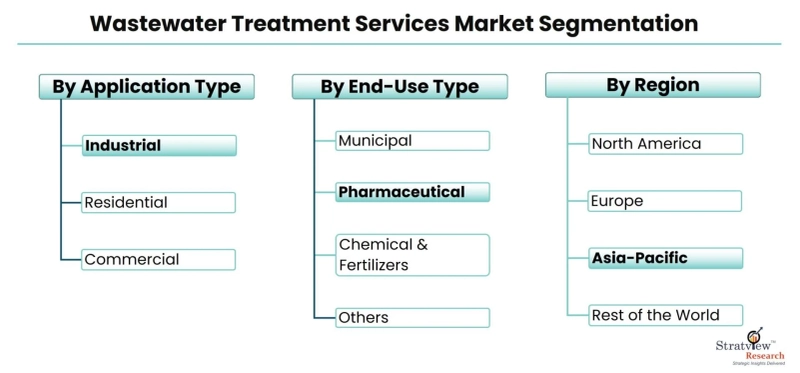According to Stratview Research, the wastewater treatment services market was estimated at USD 55.72 billion in 2022 and is likely to grow at a CAGR of 6.2% during 2023-2028 to reach USD 80.16 billion in 2028.
In the relentless pursuit of sustainability and environmental stewardship, the Wastewater Treatment Services Market stands as a key player in ensuring the responsible management of one of our most precious resources: water. This article explores the dynamic trends shaping the evolving landscape of Wastewater Treatment Services, showcasing the innovative approaches and technologies that are clearing the path towards a cleaner and more sustainable future.
Rising Global Concern for Water Security:
The Wastewater Treatment Services Market is witnessing a surge in global concern for water security. As populations grow and climate change impacts water availability, the market is responding with solutions that emphasize the efficient and responsible use of water resources through advanced treatment technologies.
Adoption of Circular Economy Principles:
Circular economy principles are gaining traction in the Wastewater Treatment Services Market. The shift towards resource recovery and reuse is transforming wastewater into a valuable resource, with treated water and recovered materials finding applications in agriculture, industry, and even potable water supplies.
Technological Advancements in Treatment Processes:
Technological advancements are revolutionizing wastewater treatment processes. Advanced oxidation processes, membrane filtration, and biological treatment innovations are enhancing the efficiency of wastewater treatment, ensuring the removal of contaminants and the production of high-quality effluent.
Decentralized Wastewater Treatment Systems:
Decentralized wastewater treatment systems are emerging as a trend in the market. These systems offer flexibility, scalability, and adaptability to diverse settings, providing effective treatment solutions for both urban and rural environments, thereby decentralizing the burden on large centralized treatment plants.
Smart Monitoring and Control Systems:
The integration of smart monitoring and control systems is optimizing the operation of wastewater treatment facilities. IoT (Internet of Things) devices and real-time data analytics enable proactive maintenance, energy optimization, and efficient resource utilization, contributing to overall operational excellence.
Green Infrastructure for Stormwater Management:
The Wastewater Treatment Services Market is increasingly incorporating green infrastructure for stormwater management. Green roofs, permeable pavements, and natural vegetation help absorb and filter rainwater, reducing the load on traditional wastewater treatment systems and mitigating the impact of urban runoff.
Focus on Energy Efficiency:
Energy efficiency is a focal point in the evolving market. Wastewater treatment facilities are exploring renewable energy sources, energy recovery from biogas, and energy-efficient technologies to minimize their carbon footprint and contribute to the overall sustainability of the treatment process.
Public-Private Partnerships for Infrastructure Development:
To address the growing demand for wastewater treatment services, public-private partnerships are becoming prevalent. Collaborations between government agencies and private entities facilitate the development of robust and cost-effective infrastructure, accelerating the implementation of wastewater treatment projects.
Stringent Regulatory Standards:
Stringent regulatory standards are driving innovation and compliance within the Wastewater Treatment Services Market. Governments worldwide are setting higher water quality standards, pushing the industry to adopt advanced technologies and ensure that treated effluent meets or exceeds stringent environmental regulations.
Integration of Nature-Based Solutions:
Nature-based solutions, such as constructed wetlands and ecological treatment systems, are gaining popularity. These approaches leverage natural processes to enhance water quality, reduce environmental impact, and provide a sustainable alternative to conventional treatment methods.
Climate-Resilient Wastewater Infrastructure:
As climate change poses challenges to water infrastructure, the Wastewater Treatment Services Market is adapting by implementing climate-resilient designs. Robust infrastructure that can withstand extreme weather events and anticipate climate-related impacts ensures the continuity of wastewater treatment services.
Community Engagement and Education Initiatives:
Community engagement and education initiatives are becoming integral to the Wastewater Treatment Services Market. Increasing awareness about the importance of wastewater treatment, water conservation, and pollution prevention fosters a sense of responsibility among communities, contributing to sustainable water management practices.
Conclusion:
The Wastewater Treatment Services Market is navigating a transformative path, guided by trends that prioritize sustainability, innovation, and resilience. From embracing circular economy principles to integrating smart technologies and nature-based solutions, the market is actively clearing the path towards a future where water resources are managed responsibly, and wastewater is treated as a valuable asset rather than a burden. As these trends continue to evolve, the Wastewater Treatment Services Market plays a pivotal role in safeguarding the health of our planet and ensuring a sustainable legacy for future generations.


